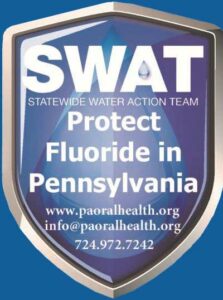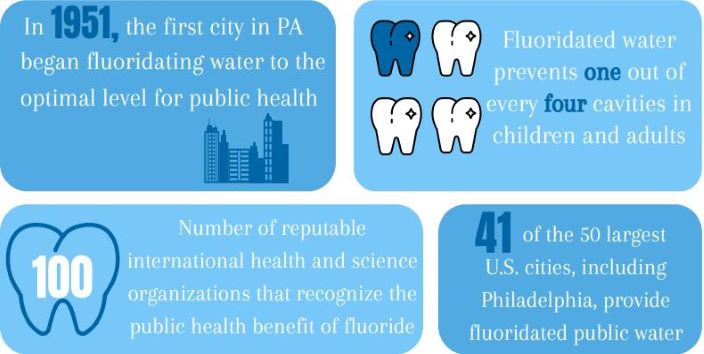About Community Water Fluoridation
For more than 75 years, community water fluoridation (CWF) has been widely recognized as a safe and effective public health intervention to prevent tooth decay. Fluoride inhibits the breakdown of enamel and enhances its resistance to tooth decay. Communities across the United States, and worldwide, adjust the fluoride concentration in their public water supply to the optimal level of 0.7 ppm for tooth decay prevention as recommended by the U.S. Public Health Service.
Focusing on prevention is important for individuals to avoid oral disease. The point of CWF is to reach those individuals that do not regularly visit a physician or dental provider or those that do not have access to supplements or preventive treatments. CWF is a safe and effective public health practice to provide the benefits of fluoride to all residents regardless of income, insurance status, and ability to access oral health care. Every major public health and medical organization, and over 2000 studies and peer-reviewed papers, support the benefits and safety of CWF in preventing tooth decay. This includes the American Dental Association, the American Academy of Pediatrics, the Centers for Disease Control and Prevention, and the past five U.S. Surgeon Generals.
PCOH strongly supports community water fluoridation as a safe, cost effective, and proven practice that promotes good oral health within our communities.
PCOH is encouraging Pennsylvanians to thank water systems for delivering safe drinking water to homes, schools, child care centers, restaurants, and businesses. Regardless of the fluoridation status of a water system, water operators do an essential job of providing safe drinking water. PCOH will provide blank thank you notes, envelopes, and a prepaid envelope to return notes back. From there, PCOH will address the note and send it on to the water system. Click here to request thank you notes.
PCOH is proud to be the Pennsylvania affiliate of the American Fluoridation Society.
Fluoride Resources
- All
- For Community Advocates
- For Decision Makers
- For Everyone
- For Water Operators
A State Official’s Guide to Science-Based Decision-Making – The Council of State Governments
This guide provides strategic guidance and includes recommendations and helpful tools for policymakers, regardless of background, to confidently assess the assumptions, conclusions and results found in state public hearing witness testimony and scientific studies. | For Decision MakersDepartment of Defense CWF Memo – United States Department of Defense (2013)
Memorandum directing DoD installations in the Unted States and territories that own or operate a potable water treatment facility serving 3,300 persons or more to provide optimally fluoridated water. Dental decay is a signifcant reason for military personnel to be classified as non-deployable. | For Decision MakersPolicy on Use of Fluoride – American Academy of Pediatric Dentistry (2018)
The American Academy of Pediatric Dentistry (AAPD) affirms that the use of fluoride as an adjunct in the prevention of caries is safe and effective. The AAPD encourages dentist and other health care providers, public health officials, and parents/caregivers to optimize fluoride exposures to reduce the risk for caries and to enhance the remineralization of affected tooth structures. | For Decision MakersFormer U.S. Chief Dental Officers Reaffirm Support of CWF – United States Public Health Service (July 2020)
Former U.S. Chief Dental Officers reaffirmed their support of CWF in honor of the 75th anniversary. | For Decision MakersCWF Info Brief – PCOH (August 2020)
Informational brief | For Decision MakersHealthy Beverage Consumption in Early Childhood – Healthy Drinks Healthy Kids
Healthy Beverage Consumption in Early Childhood: Recommendations from Key National Health and Nutrition Organizations | For EveryoneWhy Do Children Need Fluoride? – Campaign for Dental Health
Infographic poster/flyer illustrating how fluoride protects childrens' teeth | For EveryoneCommunity Water Fluoridation – National Maternal and Child Oral Health Resource Center
Website with many community water fluoridation resources. | For EveryoneAchievements in Public Health, 1900- 1999: Fluoridation of Drinking Water to Prevent Dental Caries – Centers for Disease Control and Prevention (1999)
Article from MMWR Weekly October 22, 1999/48(41); 933-940. Describes the history and evidence of CWF's safety and effectiveness leading to CDC's selection of CWF as one of the top ten public health achievements of the 20th century. | For EveryoneFluoridation is Effective – Campaign for Dental Health (2014)
A summary of decades of peer-reviewed studies and reports confirming the value of fluoridating public water systems. | For EveryoneBrush Up on Oral Health – Community Water Fluoridation – Head Start Early Childhood Learning & Knowledge Center
Website with many community water fluoridation resources. | For EveryoneCommunity Water Fluoridation Resources – Campaign for Dental Health
Website with many community water fluoridation resources. | For EveryoneFluoridation Resources – Fluoride Exposed
Website with many community water fluoridation resources. | For EveryoneCommunity Water Fluoridation Resources – American Fluoridation Society
Website with many community water fluoridation resources. | For EveryoneFrequently Asked Questions on Community Water Fluoridation – American Dental Association (2012)
3-page FAQ sheet about CWF | For EveryoneCommunity Water Fluoridation Fact Sheet – Centers for Disease Control and Prevention
One-page fact sheet about CWF with detailed references. | For EveryoneDental Facts & Benefits of Fluoride – American Fluoridation Society (2020)
Infographic illustrating key facts about fluoride. | For EveryoneFacts About Fluoride – PCOH (July 2020)
Infographic of Pennsylvania-focused fluroide facts | For EveryoneProtect Fluoride in Pennsylvania
Interested in advocating for community water fluoridation in your community? Contact nicole@paoralhealth.org to learn more about advocating and joining the Community Water Fluoridation Workgroup.
Have you heard rumblings about initiating or discontinuing community water fluoridation in your community? The Statewide Water Action Team (SWAT) wants to hear from you! As a trusted supporter of community water fluoridation, we ask you to be a SWAT member to protect water fluoridation in Pennsylvania. We know we can count on you to assist us in looking out for potential threats to water fluoridation to keep fluoride in Pennsylvania.




